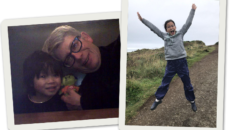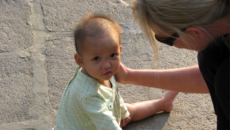For adoptive moms and dads, parenthood can arrive with all of the subtlety of a freight train. After months and months of waiting, a baby becomes yours with little warning — and when the dust starts to settle, you may feel that parenthood isn’t quite what you expected. Here are three of the most common laments from new parents, and advice to help you deal with them.
“I don’t feel like a mother yet.”
Nothing — and no one — can quite prepare us for the realities of parenthood, particularly if we’ve dreamed of a baby for so long. As a result, some new moms feel as if they’re playing house or waiting for their child’s “real” parents to come along. Some moms scrutinize their babies’ behaviors, looking for signs of belonging together. When a baby cries excessively, has a topsy-turvy sleep schedule, or makes a slow adjustment to new family routines, his mom may feel inadequate, or that she and her baby are a “bad match.”
What to do:
Find out all you can about infant development. Many of your child’s behaviors may be typical of babies her age. If you haven’t already done so, take a baby-care or parenting course, and ask experienced parents — adoptive and nonadoptive — for feedback. Also, be reassured that babies eventually view the person, or people, who consistently provide them with care and comfort as Mom and Dad.
“Dad feels like the odd man out.”
Sometimes the sheer joy of being with a new baby — and the desire of (or need for) one parent to give all the hands-on care — can make the other parent feel invisible. This imbalance is especially likely to develop if one parent has less baby-care experience than the other, or routinely defers decisions to the other.
What to do:
Create a daily routine that lets both parents spend time with the baby. Take turns with nighttime feedings, bedtime rituals, and comforting a crying infant. Having hands-on contact with the baby will give each a greater sense of joy and commitment. What’s more, babies in two-parent families feel more secure when they know that both adults can meet their physical and emotional needs.
“My older child hates the new baby!”
You did the big buildup about a baby brother or sister coming home, and your older child seemed excited. But now that the baby is here, big brother is cranky, whiny, and mad — and wants to return the baby. In fact, he wonders why you adopted a child when you had one already. He may even withdraw and avoid events where the baby is the center of attention.
What to do:
Some first children feel cast aside by the small intruder in the crib. When your child starts to whine, listen without criticizing and soothe him without denying his feelings. Try to engage him in a few baby-care tasks, or ask him to assist in creating a lifebook for the baby. Let your child know that you love him — and that the baby is staying permanently in your forever family, just as he is!


